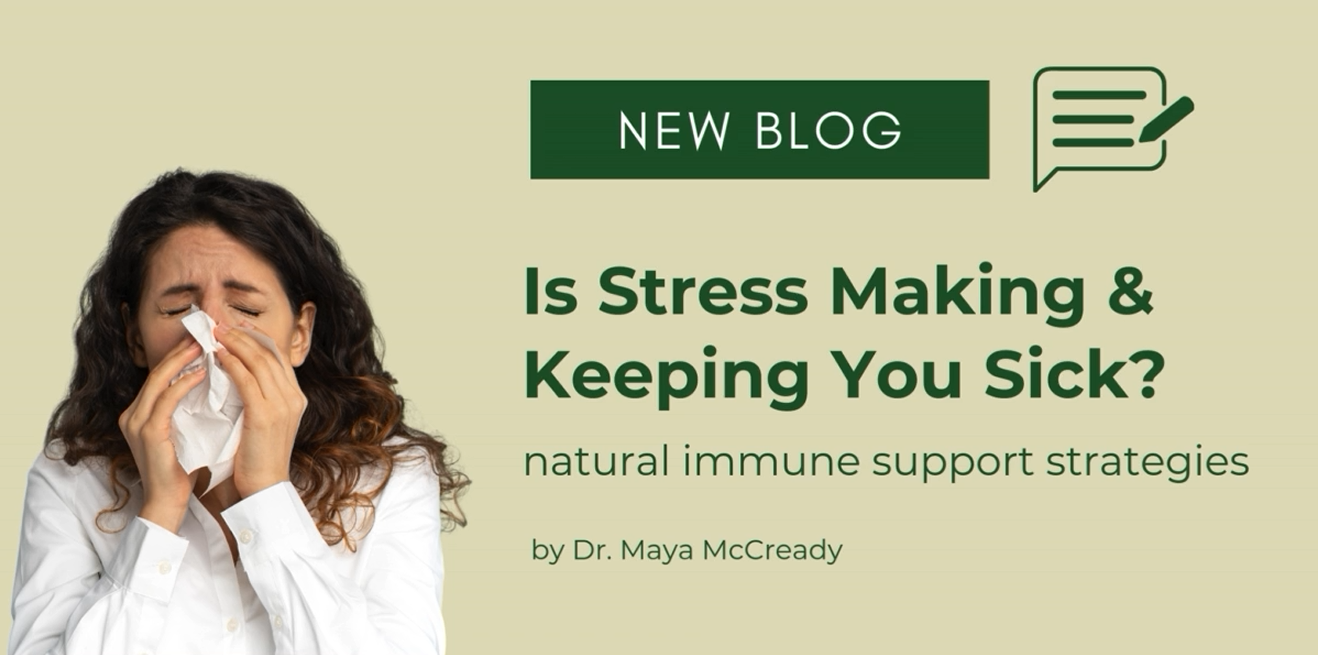
We had a “real” winter this year, really cold, snowy and dark… and with this “real” winter came lots of colds and flus. It seems like these colds and flus are frequent visitors, and people seem to be having a hard time getting rid of them once and for all. There could be a number of reasons for this, and every person’s circumstances are unique. In this article I would like to take a look at something that affects most of us on a day to day basis, the stress connection.
What Is Stress?
Stress can be very acute and obvious, and it can also be insidious, small everyday occurrences that build up gradually without our notice. Stress can be anything from a loud noise, getting stuck in traffic, conflict at work, or even low blood sugar. Stress is everywhere, we encounter it everyday, and yet, we often are not doing anything to help mitigate stress. The impacts of stress can be additive, even if it’s low grade stress.
How Does Stress Impact The Immune System?
Cortisol, the main stress hormone released under stress. Initially it will enhance the immune system, but, over time, elevated cortisol will do the opposite, and weaken the immune system. This means our defences to preventing cold and flus are down when we are in a constant state of stress.
Adding to an already weakened system, when we are under stress, our sleep quality and duration often becomes affected. While we sleep our bodies are able to regenerate and heal. Sleep enhances immune health, our bodies are able to produce immune cells to protect us while we sleep. If we are not getting good quality sleep or insufficient hours of sleep, our bodies become insufficiently armed to fight bacteria and viruses we are exposed to every day.
With 70-80% of our immune cells in in our gut, let’s not forget to have a look at stress and our gut health. In order for our digestion or gut health to operate efficiently we need to allocate energy and blood to this area. When we are in a stressed state, our bodies sends blood to our muscles and brain to prepare us for “fight or flight”. It is only when we are relaxed that our bodies can send more blood and energy inward to our digestive system.
In addition to stress affecting our ability to assimilate our foods, it also affects our gut microbiome, which we are learning more and more has a major effect on systemic immunity. Diet also plays a key role in the health of our microbiome, and often when we get stressed we are more likely to grab what’s easy – processed foods – which takes a toll on the gut microbiome, reducing immunity.
The Insulin-Blood Sugar & Immunity Connection
Cortisol (stress hormone), suppresses insulin release. Insulin is the hormone that lets sugar from your blood stream into your cells to make energy. Increased cortisol also increases our liver’s production and release of glucose (sugar) into the blood. The results in increased levels of glucose in our system, less insulin to take it out of the bloodstream, making it harder to control blood sugar levels. This in turn creates internal stress for our bodies. Dysregulated blood sugar is a vicious cycle with stress, and can affect cardiovascular health, mental health, hormonal health, weight loss resistance, and more.
Stress is complex. What our bodies and brains perceive as stress is variable, as well as how our bodies react. We do know that stress elevates cortisol, contributes to poor sleep, affects our gut microbiome as well as our blood glucose regulation. All of these factors negatively impact our immune system, and we can become vulnerable to getting sick.
How To Support Immunity Naturally
Your Naturopathic Doctor is a great resource to help mitigate stress. We can measure cortisol through blood work. We can assess if vitamins and minerals are lacking, like magnesium – to help relax the nervous system – and prescribe herbs like nervines to help deal with stress and adaptogens to help the body adapt to stress. We can tailor your diet to support a healthy gut microbiome, and use diet as well as meal timing to support healthy blood sugar levels.
An at home practice we can all do is taking 10-20 minutes everyday to intentionally release stress. The best way to do this? Taking long, slow deep breaths through your nose. You can also try humming – both deep breathing and humming stimulates the vagus nerve, which signals your body to go into a restful state. In this state, your body’s immune system can work more efficiently.
If these practices don’t work for you, simply getting away from screens for 10-20 minutes and doing something you enjoy, something that brings your awareness inwards is enough to get out of the stress cycle, even for a few minutes.
Book a FREE 15 minute discovery call with Dr. Maya to learn more about how naturopathic medicine can help you!